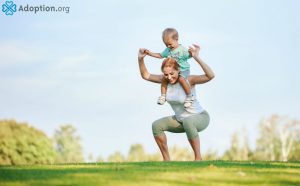Our family has adopted domestically through infant adoption and through the foster care system. We have been blessed to be confident in the addition of all of children, knowing that they were the right fit for our family.
We adopted our first child through domestic infant adoption. We took a lot of time to research all the possible physical ailments and all the short-term and long-term effects of several drugs and alcohol. We decided at that point what we felt we could handle as new parents. At the time, we were living in a very rural area of the country and felt compelled to also consider the availability of services in both the short and long term.
The first child we were asked to consider adopting was already born and waiting in foster care to be taken home by her new family. We talked and researched long and hard before we decided on this little one due to some unexpected exposures. Ultimately, we decided to put our hat in the ring and waited on the birth family’s decision. They chose someone else.
The second child we were asked to consider had a plethora of possible disabilities. We knew, instinctively and almost immediately, that we were not the right parents for this child. This child had not yet been born. Due to family history, some unique challenges in parentage, and exposure in utero, we knew that between where we were living and possible lifelong challenges, we were not prepared to give this child his best life.
Over the years, we have been presented with some children that we just knew weren’t the right choice. For others, it was harder to discern. We are fortunate to have a very adoption-friendly pediatrician. She has been through this with us in the most intimate of ways. She has always been forthright, honest, and realistic, and what a blessing that has been. Early in the process, my husband and I decided that with physical/mental disabilities, if it would or could happen to us then we would accept that responsibility. Our largest concerns have always been with the things that we would never do to our children, exposure to alcohol and drugs. Fortunately, research is constantly changing, and we have more and more information about long-term effects on the child’s physical and mental health.
Our second and third children were adopted from the US Foster Care system. This process is uniquely different in that you are now considering children who are born, have suffered trauma at the hands of their parents and loved ones, and you have pictures. For me, this made the process even harder. When we entered this process we were veteran parents, though we had not parented children with trauma. I was less scared of certain things, more scared of others, and of course, we now had our oldest son to consider when deciphering another child’s history.
As in most cases, we were presented with several case files. Some were heartbreakingly wrong for us; we just knew that the specific scenario would not work well for us. This time we had number of children, vehicles, sleeping arrangements, employment, and so many other things to consider as well. It’s much different bringing home a toddler—or in one case, a group of toddlers—than it is bringing home a tiny baby.
I’m a list maker, so lists became my friends over the years. I made sure in the excitement of learning about these new little beings to take careful notes. If there was something we didn’t understand or weren’t familiar with, we went to do more research. Thankfully, by this point we had a wonderful support network in place and we were able to talk to those who live this life every day. It was a lifesaver.
With our second son, I knew. I just knew the minute we received the email. Then they sent his photo, and I was done for. We were afraid, I believe in hindsight because just knowing that adding a second child would be hard, and adding a second with a trauma history, harder yet. But we knew. It just felt right, and we waited in agony to hear whether we would bring him home. We did, just a few weeks after learning about him.
I believe that research, preparation, and just knowing yourself, your spouse and your family will help you discern whether each child is right for your family. Knowing your strengths and weaknesses will help you know if you are the right parents for the child/children you are being asked to love and care for. If all it took was love, I know that we’d all be the perfect parents.
All our children have needs. Some needs are more significant than others; it was never about the “perfect” child, because frankly, I know all my children are perfectly made. Some needs were unexpected and at first, devastating. But we are helping them heal, thrive, and live the best life they possibly can. And let me tell you, they are going to change this world in magnificent ways.
Happy adopting!
Karla King is a passionate open adoption advocate, adoptive mom, foster mom, wife, reader, avid creator of food, stay-at-home mom, and Christian. She loves taking care of her family, supporting others on the adoption journey, and watching the world through her children’s eyes.
